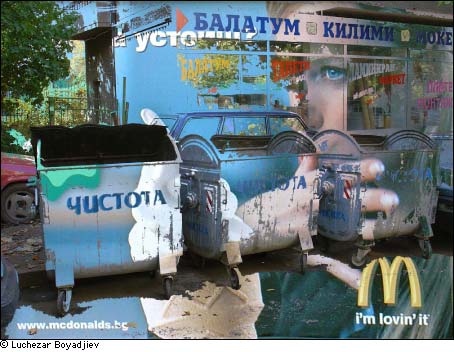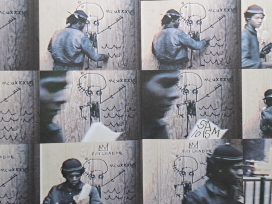How can we characterise our time – the time of us, inhabitants of the epicentres of the capitalist restoration that unfolded after the year 1989? Above all, the time that we inhabit is an odd time. The year 1989, it is difficult to conceal this, opens an odd chapter in history: a chapter of historical oddities. What is it exactly that begins with 1989? If we look at the question a bit more carefully, we cannot but be struck by the paradoxical play on time that history presents us with here. Every beginning is difficult, as one philosopher famously remarked, but the beginning of the so-called “post-socialist” situation seems to be particularly neuralgic. For what we have here is a very peculiar beginning: a beginning that already seems one step behind itself, already one step in the past.
How does post-socialism begin? The troubles of the post-socialist beginning begin at the level of nomination. As its name already shows, the post-socialist situation bears an immense mark of the past. The mark of an end. The beginning of post-socialism, its historical inception, immediately presents itself as an end, a beginning in and through an end: the end of socialism, the end of communism. This end is an exhilarating one: the end of a perceived disaster, the liberation from the torments and horrors of a “deadly illusion” to which Cold War ideology attributed the criminalising name of “totalitarianism”. But is this projection of an end, this negativity, all there is? Is post-socialism simply an announcement of something that has ended, something that has passed? Because one might also ask: What is it that begins, properly speaking, after the end? Is there something that post-socialism can claim as its own beyond the simple fact of the negation of its anteriority? Then again, is there a beginning here in the first place?
 If we look even closer, we can see that it is not simply the past that haunts the beginning of post-socialism. It is also the future. For there seems to be no end to the beginning of this situation. If it is already displaced in the past, if it is already behind itself, post-socialism seems also to be immediately ahead of itself: in a state of anticipation, a state of suspension. Before we can see it being properly formed, before we can see it taking a shape of its own, the historical essence of the post-socialist situation seems to run ahead of the eye’s gaze. Its entire consistency is projected into a certain future tense, into a promise of the future. The social scientists have aptly demonstrated this fact – not without a certain dose of embarrassment – when they meticulously measured the vectors of the post-socialist transition, thus providing the scientific bases for the ideological constructions of neoliberal capitalism.
If we look even closer, we can see that it is not simply the past that haunts the beginning of post-socialism. It is also the future. For there seems to be no end to the beginning of this situation. If it is already displaced in the past, if it is already behind itself, post-socialism seems also to be immediately ahead of itself: in a state of anticipation, a state of suspension. Before we can see it being properly formed, before we can see it taking a shape of its own, the historical essence of the post-socialist situation seems to run ahead of the eye’s gaze. Its entire consistency is projected into a certain future tense, into a promise of the future. The social scientists have aptly demonstrated this fact – not without a certain dose of embarrassment – when they meticulously measured the vectors of the post-socialist transition, thus providing the scientific bases for the ideological constructions of neoliberal capitalism.
Not anymore, not yet: post-socialism presents itself as a temporal caricature, as a floating historical state stranded between negation and anticipation, between the past and the future. We are all familiar with the catchwords here. On the one hand: the “escape from communism”, the collapse of authoritarian apparatuses, the end of stagnating economies. On the other, that irresistible desire for “liberalisation”, for “privatisation”, for “democracy”, the teleology of economic growth and social stability under the auspices of the laissez faire market model – but also the promises of “Europe” and of the inclusion in the global circuits of the capitalist economy.
But what can we say about the post-socialist present? How can we talk about the actuality of this historical situation? The problem here is that post-socialism, from within itself, in terms of its own “self-consciousness”, seems unable to offer any positive responses. As soon as it is interrogated about its present, about the actuality of its condition, the post-socialist consciousness starts playing an endless game of displacements, constantly shifting the question backwards and forward, constantly pointing either to what it no longer is, to its supposed break with the past, or to what it is not yet quite, to what it ought to be. This misplacement in time reveals an important feature of the historical situation that we are facing: its unconsciousness. Between the ideological promises of its future and the traumatic encounters with its past, no less ideological in their form, post-socialism is a state marked by a stark ignorance of its own present.
And yet it is exactly this present that addresses us, doing so in a disturbing manner. For this is a present of destruction, regression and humiliation, a present of the dramatic exacerbation of contradictions. One of the central theses of the Communist Manifesto – that the state is but the bearer of the political power of capital – acquires a remarkable breath of new life in a situation where the processes of “transition” patently reveal the state as the primary instrument of the primitive accumulation of capital, with various post-socialist governments trying to auction off, under the rubrics of “denationalisation” or “privatisation”, the entire productive capacity of their societies, as if the race for profit is the sole ingredient of the social bond, as if the enriching of a small minority presents the only thinkable conception of the Good. Post-socialism thrives on what Badiou would call a moment of “avowal”: “The organic link between the private property of the means of production – and thus structural, radical inequality – and ‘democracy’ is no longer a theme of socialist polemic, but the rule of consensus”.
In this general uncertainty into which the capitalist restoration has thrown the post-socialist societies, there is at least one stable point: a rapid decline of all the social and political manifestations of equality. As one commentator has pointed out, if we stick to purely statistical numericity, the empirical data collected across the post-socialist realm exhibits only two stable parameters: the increase of poverty and the rise of inequality. Amidst the chaos of the restoration, the only tangible point is that of a destructive impoverishment, which pushes the majority of the population to the margins of social existence, whilst creating an unbridgeable divide between wealth and poverty. The drama of this process is exacerbated by a hasty dismantling of the entirety of the institutional inscriptions of the struggles for equality which were won in the past century by the working masses, as well as with a general vassalisation of the these countries vis-à-vis the global nexuses of economic and political power. Such are the immediate “costs” of the imposition of capitalist relations of production, of the free market model and its “shock therapy”, upon situations that were once defined, for more than half a century, by the spirit of egalitarian political passion.
In order to confront the bleakness of these processes, post-socialist ideology has to borrow from religion. Here ideology indeed works like a poor man’s eschatology: stranded between the projected horrors of the past and the glorious promises of the future, the present, or actual existence, is a nullity in itself. Its worth is only measured with regard to the expectation of a promised goal, the inevitable parousia of “freedom” inherent to liberal democracy and the “progress” accorded by the development of the capitalist market. Thus, one must endure the torments of this world, one must accept the present as it is, even if this present presents itself as suffering, even if it involves the naked reduction of the human subject to the animality of capitalist exploitation, for such suffering is nothing compared to the redemption the anticipated future will bring. With the promise of the liberal-capitalist utopia, the existing state of affairs receives a benediction, whilst the entirety of the mechanisms of exclusion, domination and exploitation that structure this existence vanish before our eyes.
We should pause for a moment at these procedures of obscuration. For in fact the obscurantism of the post-socialist ideology reveals a dual structure. If the dimension of “unconsciousness” – the severing of the link between thought and the present, in the sense of the prevention of any critical grasp of the actuality of the situation – represents what one might term the objective obscurantism of the post-socialist condition, there is also a subjective dimension to this obscuration, a specific subjective obscurantism inscribed in the post-socialist situation. Besides the present being ideologically occluded in its structure of actuality, besides the occlusion of the points of exclusion and contradiction-producing mechanisms, besides, in short, systemic violence, there is also an additional subjective surplus to this operation. This surplus concerns our own subjective dispositions towards history, our own attitude – through our thoughts, volitions, decisions and actions – towards the making of history. The consciousness of history that post-socialism nourishes in this regard falls perfectly under Mallarmé’s verdict: “Un présent fait défaut”. That the “present is lacking”, as Badiou’s forceful interpretation of the phrase tells us, means that we have lost our subjective disposition for the mastery of history – and we have lost it precisely by losing the conception of the present as the practicability of a project of radical change in the here and now. A moment without the “present” is a moment in which our own subjective grip on history, our own relationship to historical time and historical change, seems completely divorced from the creative and disruptive passion for the present, divorced from the subjective capacity to reject alignment with the way of the world, to create the possibilities which strictly speaking seem impossible from within the logic of the situation. Presentless times are those times which are voided of an idea of radical change, times in which a qualitative transformation of our social conditions seems not only improbable but impossible: a foolish utopia.
Post-socialism is indeed a privileged historical place: a place where an intimate subjective relationship to the present, inscribed in the revolutionary and emancipatory politics which oriented the communist and socialist projects, is replaced with an overwhelming affinity for the past. Witness the excessive fascination of post-socialist consciousness with nineteenth-century nationalisms and with all the identitary ideologies that have followed this historical doctrine of politics. It is as if post-socialism, evoking the “certainty” and simplicity of nationalist imaginaries, had finally come to reverse the curse of Alexis de Tocqueville, who, following the unstoppable development of “democracy in America”, lamented the fact that “the past has ceased to throw its light upon the future, and the mind of man wanders in obscurity”. But Tocqueville errs: what is obscure is precisely such a wholesale absorption of the present by the past, this specific temporality of the present perfect that we see installed in post-socialism – the present of an anachronism. Instead of establishing a relationship to the living present, the sole orientation that such an operation can offer is a mortifying repetition of tradition, the ceaseless re-inscription of a dead past, whose only present function is that of preservation: the continuous confirmation and assurance of our supposed communal identity with ourselves. One should not be surprised that the apex of the subjective relationship to history that we discover here takes the form of commemoration: the relishing of historical personae excavated from the dark pages of national history, the resurgence of medieval mythologies, the parading of the bones of martyrs and despots. Commemoration envelops the community with a certainty of its particularity, but it also serves as a cover for mindless violence and destruction beyond its borders. Tradition always functions both as a pillar of identity and as the imposition of an unsurpassable barrier to it: this is why it can so easily legitimate the violent exclusion of those who do not enjoy the same relationship to the past, of those whose symbolic structuring of communal enjoyment proceeds from different traits of particularity.
But if we see the obscurity of the post-socialist consciousness of history springing from an immersion of the present in the past, its other side implies a specific coupling of the present with the future. The other modality of present perfect that post-socialism installs implies an obscurantist depiction of historical change itself. It is no longer a matter of making peace with the dead in an eternal unfolding of tradition, but of depicting the structures of the living, the parameters of the existent situation, as the only possible and desirable world. Given the inevitability of our situation, given that we have already achieved the “end of history”, it is time to approach our historical becoming, the transformation of our worldly affairs, under the infinite task of perfection. The only thing to do, in other words, is to ponder the perfection of the extant; the only question is how to manage the world of possibilities: possibilities that are structured in advance by the present conjunction of liberal democracy and capitalism.
Change is ultimately a matter of piecemeal modifications that are normed and ruled by an already discovered form, by an historical end that we already achieved – such is the wisdom of limited minds interpreting Hegel. And yet, what is most important here is the peculiar positioning of the subject with regard to history. For when grasped under the modality of perfection, change seems to be entirely divorced from collective decisions, from our subjective inventions and experimentations, and reduced to the rule of putatively objective laws. Everything changes, to be sure, the world is a buzzing present of objects in motion, of commodities enticing our enjoyment in new ways, of technological inventions transforming the very parameters of our biological being – but such change is only ever a matter of abstract processes. In the last instance, it is a matter of the deployment of the rhythms of the capitalist market and of the development of the institutions that regulate the competition of human groups. Standing under such detached determinations, change is a matter of technocratic involvement, and not of our collective subjective acts. Post-socialist consciousness separates our sense of being in history from the subjective intensity of the present, in order to deliver it to a radical desubjectivation: to an administrative managing of the effects of the vagaries of the market, to the parliamentary alleviation of the destructive cycles of capitalist production and circulation. This is what Rancière terms the logic of consensus: “Consensus knows only: real parts of the community, problems around the redistribution of powers and wealth among these parts, expert calculations over the possible forms of such redistribution, and negotiations between the representatives of these various parts”. What is lost in the consensual ruling of the present is the inherently conflictual nature of our collective life, the tension in the present between its being and its unpredictable becoming. This is why the sole subjective attitude that we have left vis-à-vis historical change is one of conformism: how better to align ourselves to the rhythms of the capitalist economy, how to conform to the uncertainties of the speculative play of the market, how better to organise our desires for fleeting commodities under the protective layer of property laws.
But what about politics and its relationship to history? The other side of perfection, we should note, implies an imposition of a peculiar temporality to politics itself: the temporality of finitude and accomplishedness. Politics is divorced from the experimental register in order to be reduced in its entirety to the question of the res finita, to the accomplished fact – whose substance is always the preservation of res privatae. In the register of the present perfect, the ends of politics are always immutably in the service of both the foundation and preservation of a totality that is closed upon itself and the regulative variations that this totality is capable of producing. Post-socialism removes politics from the present and its infinitude, from the capacity of egalitarian impulses to produce a hole in existence, in order to bring it under the ideal of the finite and finished nature of a whole – it is only as a closed totality that politics reaches its normative dimension proper, its universality can only ever be that of a formal order. In a paradigmatic textbook of post-socialist political philosophy, Raymond Aron expresses the essence of politics and the essence of democracy as “the organisation of peaceful competition with respect to the exercise of power”. Politics is thus confounded with the state, and with its formal core: juridical regulation. In the end the sole norm that the post-socialist ideology wants to measure politics against is the norm of functionality: the norm of mechanical functioning, which seeks to fashion political life as a machine of administration of the parts of the community and the circulation of goods. Such a machine, like all machines, should function like clockwork. Its time is the time of universal measurement: where all parts can be ordered according to a pre-determined scale, where calculation and efficiency rule supreme, where the future is a matter of patent predictability, and where time always unfolds linearly as a ruled succession of moments.
Within the post-socialist context, no one has provided a better formulation of this specific conception of politics and this specific conception of time than Zoran Djindic, who before his tragic career as a statesman distinguished himself as one the principal philosophical mouthpieces for liberal-democracy. The syntagm through which Djindic formulated his final judgment on Yugoslavia – “Yugoslavia as an unfinished state” – reveals precisely this: an obsession with finitude and res finitae. Djindic has nothing but aversion for the coupling of politics with infinity. Once communism, with its idea of the “withering away of the state”, strove to subvert the statist order through the dialectical introduction of infinity, it was only capable of producing a functional disaster:
One of the basic consequences of this separation [of sovereignty from the state] is that sovereignty has in principle become infinite. But a part of the dialectical characteristic of this principally infinite sovereignty, brought about by its dissociation from its status in the state, is also the permanent possibility of its complete impotence.”
According to Djindic’s juridical calculus, the tragedy of the Yugoslav conflicts of the 1980s and the 1990s was due to nothing else but the conception of infinite politics inherent to the idea of communism. Having divorced sovereignty from its coupling with the state, and thus collapsing the possibility of its own self-identity, communism could only lead towards political disaster: towards a proliferation of particularistic claims and eventually towards the disintegration of order as such. The prescription that Djindic envisaged for Yugoslavia, at the very eve of its existence, was to reintroduce the principle of juridical clarity: the clarity of a constitutional status, the clear articulation of sovereignty and the political community, which Djindic imagined as a combination of Kelsenian positivism and Hobbessian metaphysics. The only solution, in other words, was to “complete the Yugoslav state”. This is why, in the end, Djindic would see the disaster of communism as much worse than the perils of nationalism: at least nationalism, as inscribed precisely in the destructive political decisions burgeoning before Djindic’s eyes, proceeded from a principle of identitary clarity, from an idea of a closed and accomplished whole.
The post-socialist ideology here imprints a transcendent form upon politics, which limits both its time and its scope. The fetish of Law ensures that the ultimate aim of political decisions and gestures can only ever be the establishment of the rule of law itself. This logic is tautological, for these gestures and decisions are only possible within a prior context of rationality and normativity provided by the juridical framework. But the tautology has determinate temporal effects: it nullifies all exceptional moments; it seeks to extinguish all instances of the present, all singular political inventions, all the declarations of the non-alignment with the way of the world. From within the logic of the whole, strictly speaking, nothing ever happens outside of it: nothing but the insignificant singularity of the place or the disastrous contingency of disorder.
***
The now of post-socialism is an odd time, a time turned on its head. Putting it on its feet constitutes one of the principle tasks of thought today. The problem we face seems precisely to be that of the present as the time of the constitution of the subject. Politics can only begin when we insert a cog into the present perfect: with an affirmation that the situations politics treats cannot be represented as closed totalities, that such situations are necessarily marked by incompleteness and openness. Every situation is incomplete because it can be interrupted by the emergence of the present as kairos: by an infinite temporal opening that breaks apart the circular movement of time. In opposition to Djindic’s amnesiac logic, the very idea of communist politics, inscribed in the Yugoslav project, can serve as a guide in this regard. If something took place in the year 1943, when the project of Yugoslavia was born out of the Partisan struggle, this was precisely a radical manifestation of the present: the emergence of a practice of equality (of classes, nations, genders) that was capable of reaching beyond the coordinates of possibility of the existent situation and initiating an open process of political invention. As an egalitarian project, a project of emancipation, Yugoslavia represented since its very inception an incompletable, unfinishable state. This is why the example of 1943 speaks to us today as a paradigm of a specific subjective construction of time, as a paradigm of its necessary infinitude. For communism is nothing but this: an attitude towards history that incessantly seeks to divide the present from itself in order to affirm novelties that seem impossible within it.

 If we look even closer, we can see that it is not simply the past that haunts the beginning of post-socialism. It is also the future. For there seems to be no end to the beginning of this situation. If it is already displaced in the past, if it is already behind itself, post-socialism seems also to be immediately ahead of itself: in a state of anticipation, a state of suspension. Before we can see it being properly formed, before we can see it taking a shape of its own, the historical essence of the post-socialist situation seems to run ahead of the eye’s gaze. Its entire consistency is projected into a certain future tense, into a promise of the future. The social scientists have aptly demonstrated this fact – not without a certain dose of embarrassment – when they meticulously measured the vectors of the post-socialist transition, thus providing the scientific bases for the ideological constructions of neoliberal capitalism.
If we look even closer, we can see that it is not simply the past that haunts the beginning of post-socialism. It is also the future. For there seems to be no end to the beginning of this situation. If it is already displaced in the past, if it is already behind itself, post-socialism seems also to be immediately ahead of itself: in a state of anticipation, a state of suspension. Before we can see it being properly formed, before we can see it taking a shape of its own, the historical essence of the post-socialist situation seems to run ahead of the eye’s gaze. Its entire consistency is projected into a certain future tense, into a promise of the future. The social scientists have aptly demonstrated this fact – not without a certain dose of embarrassment – when they meticulously measured the vectors of the post-socialist transition, thus providing the scientific bases for the ideological constructions of neoliberal capitalism. 




